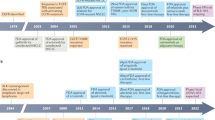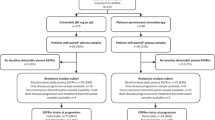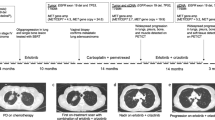Key Points
-
Oncogene-addicted subtypes of non-small-cell lung cancer (NSCLC), with dramatic responses to tyrosine kinase inhibitors (TKIs) are well recognized, with EGFR mutant and ALK rearrengement being two prominent examples
-
Acquired resistance after initial clinical benefit inevitably occurs, usually within 1–2 years of starting therapy
-
Acquired resistance can occur through failure of drug delivery to the _target, as in isolated central nervous system (CNS) progression, or by selection of biological variants during TKI exposure
-
Treatment approaches to acquired resistance include use of local ablative therapies to sites of progression and continuation of TKIs, cytotoxic chemotherapy or, if available, change in relevant _targeted therapy
-
Clinical trials of acquired resistance in the future may have to consider the importance of the CNS as a sanctuary site
-
Trials of acquired resistance should consider the re-emergence of disease sensitive to the original TKI if there is an intervening period when the TKI-specific resistance selection pressure is relaxed
Abstract
The use of advanced molecular profiling to direct the use of _targeted therapy, such as tyrosine kinase inhibitors (TKIs) for patients with advanced-stage non-small-cell lung cancer (NSCLC), has revolutionized the treatment of this disease. However, acquired resistance, defined as progression after initial benefit, to _targeted therapies inevitably occurs. This Review explores breakthroughs in the understanding and treatment of acquired resistance in NSCLC, focusing on EGFR mutant and ALK rearrangement-positive disease, which may be relevant across multiple different solid malignancies with oncogene-addicted subtypes. Mechanisms of acquired resistance may be pharmacological (that is, failure of delivery of the drug to its _target) or biological, resulting from evolutionary selection on molecularly diverse tumours. A number of clinical approaches can maintain control of the disease in the acquired resistance setting, including the use of radiation to treat isolated areas of progression and adding or switching to cytotoxic chemotherapy. Furthermore, novel approaches that have already proven successful include the development of second-generation and third-generation inhibitors and the combination of some of these inhibitors with antibodies directed against the same _target. With our increased understanding of the spectrum of acquired resistance, major changes in how we conduct clinical research in this setting are now underway.
This is a preview of subscription content, access via your institution
Access options
Subscribe to this journal
Receive 12 print issues and online access
We are sorry, but there is no personal subscription option available for your country.
Buy this article
- Purchase on SpringerLink
- Instant access to full article PDF
Prices may be subject to local taxes which are calculated during checkout



Similar content being viewed by others
References
Li, C. et al. Spectrum of oncogenic driver mutations in lung adenocarcinomas from East Asian never smokers. PLoS ONE 6, e28204 (2011).
Mok, T. S. et al. Gefitinib or carboplatin-paclitaxel in pulmonary adenocarcinoma. N. Engl. J. Med. 361, 947–957 (2009).
Rosell, R. et al. Erlotinib versus standard chemotherapy as first-line treatment for European patients with advanced EGFR mutation-positive non-small-cell lung cancer (EURTAC): a multicentre, open-label, randomised phase 3 trial. Lancet Oncol. 13, 239–246 (2012).
Sequist, L. V. et al. Phase III study of afatinib or cisplatin plus pemetrexed in patients with metastatic lung adenocarcinoma with EGFR mutations. J. Clin. Oncol. 31, 3327–3334 (2013).
Kwak, E. L. et al. Anaplastic lymphoma kinase inhibition in non-small-cell lung cancer. N. Engl. J. Med. 363, 1693–1703 (2010).
Camidge, D. R. et al. Activity and safety of crizotinib in patients with ALK-positive non-small-cell lung cancer: updated results from a phase 1 study. Lancet Oncol. 13, 1011–1019 (2012).
Shaw, A. T. et al. Crizotinib versus chemotherapy in advanced ALK-positive lung cancer. N. Engl. J. Med. 368, 2385–2394 (2013).
Bergethon, K. et al. ROS1 rearrangements define a unique molecular class of lung cancers. J. Clin. Oncol. 30, 863–870 (2012).
Ou, S. H. et al. Activity of crizotinib (PF02341066), a dual mesenchymal-epithelial transition (MET) and anaplastic lymphoma kinase (ALK) inhibitor, in a non-small cell lung cancer patient with de novo MET amplification. J. Thorac. Oncol. 6, 942–946 (2011).
Gautschi, O. et al. A patient with BRAF V600E lung adenocarcinoma responding to vemurafenib. J. Thorac. Oncol. 7, e23–e24 (2012).
Mazieres, J. et al. Lung cancer that harbours a HER2 mutation: epidemiologic characteristics and therapeutic perspectives. J. Clin. Oncol. 31, 1997–2003 (2013).
Drilon, A. et al. Response to cabozantinib in patients with RET fusion-positive lung adenocarcinomas. Cancer Discov. 3, 630–635 (2013).
Jackman, D. et al. Clinical definition of acquired resistance to epidermal growth factor receptor tyrosine kinase inhibitors in non-small-cell lung cancer. J. Clin. Oncol. 28, 357–360 (2010).
Yu, H. A. et al. Poor response to erlotinib in patients with tumours containing baseline EGFR T790M mutations found by routine clinical molecular testing. Ann. Oncol. 25, 423–428 (2014).
Gong, Y. et al. Induction of BIM is essential for apoptosis triggered by EGFR kinase inhibitors in mutant EGFR-dependent lung adenocarcinomas. PLoS Med. 4, e294 (2007).
Costa, D. B. et al. BIM mediates EGFR tyrosine kinase inhibitor-induced apoptosis in lung cancers with oncogenic EGFR mutations. PLoS Med. 4, 1669–1679 (2007).
Faber, A. C. et al. BIM expression in treatment-naive cancers predicts responsiveness to kinase inhibitors. Cancer Discov. 1, 352–365 (2011).
Ng, K. P. et al. A common BIM deletion polymorphism mediates intrinsic resistance and inferior responses to tyrosine kinase inhibitors in cancer. Nat. Med. 18, 521–528 (2012).
Rudin, C. M. et al. Pharmacogenomic and pharmacokinetic determinants of erlotinib toxicity. J. Clin. Oncol. 26, 1119–1127 (2008).
Bowlin, S. J. et al. Twelve-month frequency of drug-metabolizing enzyme and transporter-based drug-drug interaction potential in patients receiving oral enzyme-_targeted kinase inhibitor antineoplastic agents. Mayo Clin. Proc. 88, 139–148 (2013).
Budha, N. R. et al. Drug absorption interactions between oral _targeted anticancer agents and PPIs: is pH-dependent solubility the Achilles heel of _targeted therapy? Clin. Pharmacol. Ther. 92, 203–213 (2012).
Hamilton, M. et al. Effects of smoking on the pharmacokinetics of erlotinib. Clin. Cancer Res. 12, 2166–2171 (2006).
Yeo, W. L. et al. Erlotinib at a dose of 25 mg daily for non-small cell lung cancers with EGFR mutations. J. Thorac. Oncol. 5, 1048–1053 (2010).
Riely, G. J. et al. Prospective assessment of discontinuation and reinitiation of erlotinib or gefitinib in patients with acquired resistance to erlotinib or gefitinib followed by the addition of everolimus. Clin. Cancer Res. 13, 5150–5155 (2007).
Browning, E. T., Weickhardt, A. J. & Camidge, D. R. Response to crizotinib rechallenge after initial progression and intervening chemotherapy in ALK lung cancer. J. Thorac. Oncol. 8, e21 (2013).
Foo, J., Chmielecki, J., Pao, W. & Michor, F. Effects of pharmacokinetic processes and varied dosing schedules on the dynamics of acquired resistance to erlotinib in EGFR-mutant lung cancer. J. Thorac. Oncol. 7, 1583–1593 (2012).
Lai, C. S., Boshoff, C., Falzon, M. & Lee, S. M. Complete response to erlotinib treatment in brain metastases from recurrent NSCLC. Thorax 61, 91 (2006).
Togashi, Y. et al. Cerebrospinal fluid concentration of gefitinib and erlotinib in patients with non-small cell lung cancer. Cancer Chemother. Pharmacol. 70, 399–405 (2012).
Heon, S. et al. Development of central nervous system metastases in patients with advanced non-small cell lung cancer and somatic EGFR mutations treated with gefitinib or erlotinib. Clin. Cancer Res. 16, 5873–5882 (2010).
Grommes, C. et al. “Pulsatile” high-dose weekly erlotinib for CNS metastases from EGFR mutant non-small cell lung cancer. Neuro Oncol. 13, 1364–1369 (2011).
Sequist, L. V. et al. Genotypic and histological evolution of lung cancers acquiring resistance to EGFR inhibitors. Sci. Transl. Med. 3, 75ra26 (2011).
Shaw, A. T. et al. Effect of crizotinib on overall survival in patients with advanced non-small-cell lung cancer harbouring ALK gene rearrangement: a retrospective analysis. Lancet Oncol. 12, 1004–1012 (2011).
Weickhardt, A. J. et al. Local ablative therapy of oligoprogressive disease prolongs disease control by tyrosine kinase inhibitors in oncogene-addicted non-small-cell lung cancer. J. Thorac. Oncol. 7, 1807–1814 (2012).
Costa, D. B. et al. CSF concentration of the anaplastic lymphoma kinase inhibitor crizotinib. J. Clin. Oncol. 29, e443–e445 (2011).
Crinò, L. et al. Clinical experience with crizotinib in patients with advanced ALK-positive non-small cell Lung cancer and brain metastases. Presented at European Cancer Congress 2013 [online]
Kobayashi, S. et al. EGFR mutation and resistance of non-small-cell lung cancer to gefitinib. N. Engl. J. Med. 352, 786–792 (2005).
Pao, W. et al. Acquired resistance of lung adenocarcinomas to gefitinib or erlotinib is associated with a second mutation in the EGFR kinase domain. PLoS Med. 2, e73 (2005).
Yun, C. H. et al. The T790M mutation in EGFR kinase causes drug resistance by increasing the affinity for ATP. Proc. Natl Acad. Sci. USA 105, 2070–2075 (2008).
Ercan, D. et al. Amplification of EGFR T790M causes resistance to an irreversible EGFR inhibitor. Oncogene 29, 2346–2356 (2010).
Balak, M. N. et al. Novel D761Y and common secondary T790M mutations in epidermal growth factor receptor-mutant lung adenocarcinomas with acquired resistance to kinase inhibitors. Clin. Cancer Res. 12, 6494–6501 (2006).
Costa, D. B., Schumer, S. T., Tenen, D. G. & Kobayashi, S. Differential responses to erlotinib in epidermal growth factor receptor (EGFR)-mutated lung cancers with acquired resistance to gefitinib carrying the L747S or T790M secondary mutations. J. Clin. Oncol. 26, 1182–1184 (2008).
Choi, Y. L. et al. EML4-ALK mutations in lung cancer that confer resistance to ALK inhibitors. N. Engl. J. Med. 363, 1734–1739 (2010).
Katayama, R. et al. Mechanisms of acquired crizotinib resistance in ALK-rearranged lung Cancers. Sci. Transl. Med. 4, 120ra117 (2012).
Doebele, R. C. et al. Mechanisms of resistance to crizotinib in patients with ALK gene rearranged non-small cell lung cancer. Clin. Cancer Res. 18, 1472–1482 (2012).
Cortes, J. et al. Dynamics of BCR-ABL kinase domain mutations in chronic myeloid leukemia after sequential treatment with multiple tyrosine kinase inhibitors. Blood 110, 4005–4011 (2007).
Engelman J. A. et al. MET amplification leads to gefitinib resistance in lung cancer by activating ERBB3 signalling. Science 316, 1039–1043 (2007).
Bean, J. et al. MET amplification occurs with or without T790M mutations in EGFR mutant lung tumours with acquired resistance to gefitinib or erlotinib. Proc. Natl Acad. Sci. USA 104, 20932–20937 (2007).
Yano, S., Takeuchi, S., Nakagawa, T. & Yamada, T. Ligand-triggered resistance to molecular _targeted drugs in lung cancer: roles of hepatocyte growth factor and epidermal growth factor receptor ligands. Cancer Sci. 103, 1189–1194 (2012).
Ohashi, K. et al. Lung cancers with acquired resistance to EGFR inhibitors occasionally harbour BRAF gene mutations but lack mutations in KRAS, NRAS, or MEK1. Proc. Natl Acad. Sci. USA 109, E2127–E2133 (2012).
Takezawa, K. et al. HER2 amplification: a potential mechanism of acquired resistance to EGFR inhibition in EGFR-mutant lung cancers that lack the second-site EGFRT790M mutation. Cancer Discov. 2, 922–933 (2012).
Yu, H. A. et al. Analysis of tumour specimens at the time of acquired resistance to EGFR-TKI therapy in 155 patients with EGFR-mutant lung cancers. Clin. Cancer Res. 19, 2240–2247 (2013).
Ware, K. E. et al. A mechanism of resistance to gefitinib mediated by cellular reprogramming and the acquisition of an FGF2-FGFR1 autocrine growth loop. Oncogenesis 2, e39 (2013).
Sasaki, T. et al. A novel ALK secondary mutation and EGFR signalling cause resistance to ALK kinase inhibitors. Cancer Res. 71, 6051–6060 (2011).
Kim, S. et al. Heterogeneity of genetic changes associated with acquired crizotinib resistance in ALK-rearranged lung cancer. J. Thorac. Oncol. 8, 415–422 (2013).
Suda, K. et al. Epithelial to mesenchymal transition in an epidermal growth factor receptor-mutant lung cancer cell line with acquired resistance to erlotinib. J. Thorac. Oncol. 6, 1152–1161 (2011).
Zhang, Z. et al. Activation of the AXL kinase causes resistance to EGFR-_targeted therapy in lung cancer. Nat. Genet. 44, 852–860 (2012).
Ercan, D. et al. Reactivation of ERK signalling causes resistance to EGFR kinase inhibitors. Cancer Discov. 2, 934–947 (2012).
Jackman, D. M. et al. Response and resistance in a non-small-cell lung cancer patient with an epidermal growth factor receptor mutation and leptomeningeal metastases treated with high-dose gefitinib. J. Clin. Oncol. 24, 4517–4520 (2006).
Bearz, A. et al. Activity of pemetrexed on brain metastases from non-small cell lung cancer. Lung Cancer 68, 264–268 (2010).
Nagpal, S., Riess, J. & Wakelee, H. Treatment of leptomeningeal spread of NSCLC: a continuing challenge. Curr. Treat. Options Oncol. 13, 491–504 (2012).
Shaw, A. T. et al. Results of a first-in-human phase I study of the ALK inhibitor LDK378 in advanced solid tumours [abstract]. Ann. Oncol. 23 (Suppl. 9), a440 (2012).
Camidge, D. R. et al. First-in-human dose-finding study of the ALK/EGFR inhibitor AP26113 in patients with advanced malignancies: updated results [abstract]. J. Clin. Oncol. 31 (Suppl.) a8031 (2013).
Chaft, J. E. et al. Disease flare after tyrosine kinase inhibitor discontinuation in patients with EGFR-mutant lung cancer and acquired resistance to erlotinib or gefitinib: implications for clinical trial design. Clin. Cancer Res. 17, 6298–6303 (2011).
Chmielecki, J. et al. Optimization of dosing for EGFR-mutant non-small cell lung cancer with evolutionary cancer modeling. Sci. Transl. Med. 3, 90ra59 (2011).
Yu, H. A. et al. Local therapy with continued EGFR tyrosine kinase inhibitor therapy as a treatment strategy in EGFR-mutant advanced lung cancers that have developed acquired resistance to EGFR tyrosine kinase inhibitors. J. Thorac. Oncol. 8, 346–351 (2013).
Moran, T. & Sequist, L. V. Timing of epidermal growth factor receptor tyrosine kinase inhibitor therapy in patients with lung cancer with EGFR mutations. J. Clin. Oncol. 30, 3330–3336 (2012).
Li, D. et al. BIBW2992, an irreversible EGFR/HER2 inhibitor highly effective in preclinical lung cancer models. Oncogene 27, 4702–4711 (2008).
Kwak, E. L. et al. Irreversible inhibitors of the EGF receptor may circumvent acquired resistance to gefitinib. Proc. Natl Acad. Sci. USA 102, 7665–7670 (2005).
Engelman, J. A. et al. PF00299804, an irreversible pan-ERBB inhibitor, is effective in lung cancer models with EGFR and ERBB2 mutations that are resistant to gefitinib. Cancer Res. 67, 11924–11932 (2007).
Sequist, L. V. et al. Neratinib, an irreversible pan-ErbB receptor tyrosine kinase inhibitor: results of a phase II trial in patients with advanced non-small-cell lung cancer. J. Clin. Oncol. 28, 3076–3083 (2010).
Miller, V. A. et al. Afatinib versus placebo for patients with advanced, metastatic non-small-cell lung cancer after failure of erlotinib, gefitinib, or both, and one or two lines of chemotherapy (LUX-Lung 1): a phase 2b/3 randomised trial. Lancet Oncol. 13, 528–538 (2012).
Janne, P. A. et al. Efficacy and safety of PF-00299804 (PF299) in patients (pt) with advanced NSCLC after failure of at least one prior chemotherapy regimen and prior treatment with erlotinib (E): a two-arm, phase II trial [abstract]. J. Clin. Oncol. 27 (Suppl.), a8063 (2009).
Godin-Heymann, N. et al. The T790M “gatekeeper” mutation in EGFR mediates resistance to low concentrations of an irreversible EGFR inhibitor. Mol. Cancer Ther. 7, 874–879 (2008).
Camidge, D. R. et al. A phase Ib study of high-dose intermittent (HDI) afatinib in EGFR T790M mutation-positive non-small cell lung cancer patients with acquired resistance to reversible EGFR TKIs [abstract P2.11–011]. J. Thorac. Oncol. 8 (Suppl. 2), S893 (2013).
Zhou, W. et al. Novel mutant-selective EGFR kinase inhibitors against EGFR T790M. Nature 462, 1070–1074 (2009).
Sequist, L. V. et al. First-in-human evaluation of CO-1686, an irreversible, selective, and potent tyrosine kinase inhibitor of EGFR T790M [abstract]. J. Clin Oncol. 31 (Suppl.), a2524 (2013).
Ranson, M. et al. AZD9291: an irreversible inhibitor of epidermal growth factor receptor (EGFR) activating and resistance mutations in non-small cell lung cancer (NSCLC) [abstract P1.11–034]. J. Thorac. Oncol. 8 (Suppl. 2), S893 (2013).
Janjigian, Y. Y. et al. Activity of afatinib/cetuximab in patients with EGFR mutant non-small cell lung cancer and acquires resistance to EGFR inhibitors [abstract]. Ann. Oncol. 23 (Suppl. 9), a12270 (2012).
Camidge, D. R. Taking aim at ALK across the blood-brain barrier. J. Thorac. Oncol. 8, 389–390 (2013).
Lin, N. U. et al. Challenges relating to solid tumour brain metastases in clinical trials, part 1: patient population, response, and progression. A report from the RANO group. Lancet Oncol. 14, e396–406 (2013).
Author information
Authors and Affiliations
Contributions
All authors contributed equally to this article, including discussion of content, writing, and editing the manuscript before submission and after peer review.
Corresponding author
Ethics declarations
Competing interests
The authors declare no competing financial interests.
Rights and permissions
About this article
Cite this article
Camidge, D., Pao, W. & Sequist, L. Acquired resistance to TKIs in solid tumours: learning from lung cancer. Nat Rev Clin Oncol 11, 473–481 (2014). https://doi.org/10.1038/nrclinonc.2014.104
Published:
Issue Date:
DOI: https://doi.org/10.1038/nrclinonc.2014.104
This article is cited by
-
Primary versus acquired epidermal growth factor receptor Thr790Met mutant non-small cell lung cancer: clinical features and prognoses
Clinical and Translational Oncology (2024)
-
_targeting EphA2: a promising strategy to overcome chemoresistance and drug resistance in cancer
Journal of Molecular Medicine (2024)
-
Results of the phase IIa study to evaluate the efficacy and safety of rezivertinib (BPI-7711) for the first-line treatment of locally advanced or metastatic/recurrent NSCLC patients with EGFR mutation from a phase I/IIa study
BMC Medicine (2023)
-
APOBEC3-mediated mutagenesis in cancer: causes, clinical significance and therapeutic potential
Journal of Hematology & Oncology (2023)
-
CA916798 predicts poor prognosis and promotes Gefitinib resistance for lung adenocarcinoma
BMC Cancer (2023)



